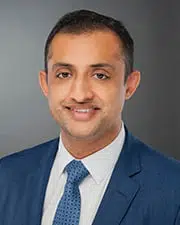Expert PFO Closure in Katy for Lasting Heart Health
At Advanced Cardiology, we provide precise and minimally invasive PFO closure in Katy to help prevent stroke and improve your heart’s function with expert care tailored to you.
Why Choose Advanced Cardiology for PFO Closure in Katy?
A patent foramen ovale (PFO) is a small opening in the heart that can increase the risk of stroke or other complications if left untreated. Our minimally invasive PFO closure procedure safely seals this opening to reduce those risks and improve your overall heart health.
At Advanced Cardiology in Katy, TX, and proudly serving patients from Sugar Land, Richmond, and the Greater Houston area, we use state-of-the-art imaging and catheter-based techniques to perform PFO closures with precision and care.
Led by board-certified cardiologist Dr. Adnan Khalid, our team delivers personalized treatment plans and detailed follow-ups to ensure your heart stays healthy long after the procedure. Whether you’re seeking preventive care or managing stroke risk, our expert team is here to help.
Meet the Cardiologist

Adnan Khalid, MD, Cardilogist
Education
Dr. Adnan Khalid, MD
Adnan Khalid, MD, specializes in treating coronary artery disease, peripheral artery disease, heart failure, hypertension, arrhythmias, and hyperlipidemia. He has over 10 years of experience in the field of cardiovascular medicine.
Dr. Khalid graduated from his medical school among the top 10 out of 250 medical students in his class. He is fellowship trained in cardiovascular diseases, interventional cardiology, advanced heart failure, and transplant cardiology. He is focused on providing personalized and compassionate care. Dr. Khalid believes in spending time with his patients and listening to their needs and is committed to offering excellent care.
Dr. Khalid is an avid reader. He is eager to learn new things; He likes to work out and spend time with his family. When off from work, he likes to travel and spend time in nature along with family and friends. He is married with three children. Dr. Adnan Khalid is now seeing patients at our Katy and Sugar Land clinics—accepting new patients from Houston and surrounding areas.
Board Certifications
American Board of Internal Medicine
Interventional Cardiology


Why Cardiologists Recommend PFO Closure
PFO closure is often recommended to reduce the risk of stroke and other complications linked to a patent foramen ovale, especially when traditional treatments like blood thinners aren’t enough. Our cardiologists evaluate your heart’s condition carefully to determine if this minimally invasive procedure is the right choice for you.
Common Reasons for PFO Closure:
Stroke or Transient Ischemic Attack (TIA)
Why It Matters: A PFO can allow blood clots to pass from the right to left side of the heart and travel to the brain, causing a stroke or TIA.
How Closure Helps: Sealing the PFO prevents clots from bypassing the lungs and reduces the risk of future neurological events.
Migraines with Aura
Why It Matters: Some studies link PFO to severe migraines with aura, which may improve after closure.
How Closure Helps: Closing the PFO can reduce the frequency and severity of migraines in selected patients.
Decompression Sickness in Divers
Why It Matters: PFO increases risk of nitrogen bubbles passing through the heart during rapid pressure changes, causing decompression sickness.
How Closure Helps: Closing the PFO lowers this risk and allows safer diving activities.
If you have a history of unexplained strokes or neurological symptoms, consult our Katy cardiologists to see if PFO closure is right for you. We offer quick evaluations and personalized care to keep your heart and brain healthy.
What Diagnostic Tests Reveal Before PFO Closure
Detection of Patent Foramen Ovale (PFO):
Tests like transesophageal echocardiogram (TEE) or bubble study identify the presence and size of the PFO—a small opening between the heart’s atria that should have closed after birth.
Risk of Paradoxical Embolism:
These tests assess whether blood clots or bubbles can pass through the PFO and enter systemic circulation, increasing the risk of stroke or other complications.
Evaluation of Stroke Cause:
In patients with unexplained strokes, identifying a PFO helps cardiologists determine if closure might prevent future neurological events.
Heart Function and Structure:
Additional imaging evaluates heart size, function, and any other structural abnormalities to ensure a safe and effective closure procedure.
Based on these findings, your cardiologist will recommend whether PFO closure is necessary or if other treatments are more appropriate. Early diagnosis and intervention at Advanced Cardiology in Katy can significantly reduce your risk of stroke and improve your quality of life.

When Should You Consider PFO Closure?
Deciding if PFO closure is right for you involves careful evaluation by our skilled cardiologists in Katy. Consider this procedure if:
-
You have experienced unexplained strokes or transient ischemic attacks (TIAs) linked to a PFO
-
You suffer from migraines with aura that may be connected to a PFO
-
You’ve been diagnosed with a PFO during a heart exam after neurological symptoms
-
Medical therapy alone hasn’t reduced your risk of stroke or related complications
Early consultation can help determine the best path to protect your heart and brain health.

Insurance and PFO Coverage
At Advanced Cardiology, most major insurance plans cover PFO closure when medically necessary, such as after a stroke. Contact our clinic or your provider to confirm specific coverage details.

Decisions Based on PFO Closure Findings
At Advanced Cardiology in Katy, your PFO closure results help guide next steps in your heart health journey. Whether you’ve had a stroke or are managing unexplained symptoms, your care plan may include:
-
Starting or adjusting blood thinners or heart medications
-
Monitoring for stroke prevention or migraine improvement
-
Scheduling follow-up imaging (like echocardiograms)
-
Personalized lifestyle guidance to support long-term heart health
New Patient Paperwork At Advanced Cardiology
Please print out your paperwork and bring it to your appointment at Advanced Cardiology. If your insurance requires authorization, please be sure to have that information sent to our office or bring it with you to your appointment, along with any medical records you may have. Please also make sure to bring your insurance cards, photo ID, and medication list.
Thank you, and we look forward to meeting you! Contact us today with any questions.
Call to Schedule Your Appointment!
Most insurance plans accepted
(713) 258-6111
Houston Cardiologist
We diagnose and treat heart disease, such as congenital heart defects, coronary artery disease, heart rhythm disorders and heart failure.
About our Cardiologist: Comments from our Patients
# Cooperative & professional staff. Dr. Khalid is highly competent & experienced. Very kind & friendly too.
# He’s A Very Caring & Concerned Doctor. He Asks Important Questions, He Allows Me To Ask Questions & Fully Answers To My Satisfaction. He Diagnosis & Does Whatever It Takes To Fix My Health Issues. He’s A Wonderful Doctor…& Most Of All, I Trust Him & His Staff.
Read More…..
Where Houston Hearts Heal – Advanced Cardiovascular Care
Heart health isn’t just important — it’s life-defining. For individuals facing cardiovascular challenges, timely access to expert care can make all the difference. In Houston, advanced cardiovascular care combines cutting-edge diagnostics, innovative treatment…
